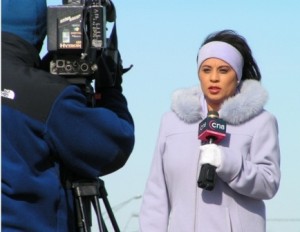extra, extra: sexism alive and well in journalism

‘Since it’s your first time interviewing him, wear a skirt and you’ll be fine.’ This is the advice a female reporter was given as she planned for an interview with a police officer, which she passed on anonymously for the world to see. The majority of the tumblr fare I indulge in is ‘for the LOLs’, but the Said to Lady Journos page left me very sad face indeed.
Said to Lady Journos was created as a means to highlight comments the females of the fourth estate encounter in their field. From observations on her appearance to her performance and everything in between, there is seemingly no end to the sexism faced by the Lady Journo. While submissions to the tune of ‘wouldn’t you prefer a house and husband?’ and ‘I was expecting a man’ are grossly reductive to the aptitude of these career women, there are some that read more disturbing than others, i.e. those that highlight the sexual harassment. First come the unwanted advances of sources, then bosses, and then there are these shudder-worthy submissions quoted from community authority figures like police:
‘Let me know if you’re ever free. We could use you as pedophile bait [sic].’
Unfortunately the sexism is not just beholden online, with more warnings coming as the media themselves berate Journalist Barbie. (I use said term to highlight the low expectations of women journalists, and to reference a book my gran gave me when I was eleven.Worst. Present. Ever.)
When Geoffrey Barker recently criticised commercial television news standards in The Age, his argument focused on female journalists of the genus he so deemed ‘TV babes’. I am not a fan of commercial journalism and certainly agree with his observation that ‘journalism is not a showbiz spinoff to be squeezed between ad breaks.’ But Barker objectifies these young reporters just as the networks that capitalise off them. These still-learning Lady Journos cop the flack that their producers deserve all too much, and are targeted for following the guidelines of their job. Still, Barker comments on their capacity to report even on pressing news: ‘They are about as credible as the ads for the exercise machines with which they share the airways.’ Perhaps all the commercial news women will be worthy of – to Barker and his peers – is this style of compliment a Lady Journo received from her boss: ‘I saw the last story you were in, and I remember thinking it didn’t suck.’
It is a daunting prospect to be confronted by such discrimination in the field of work you are so desperate to be employed in, particularly so when your personal experiences have been positive… well, you know, so far. When this happens, your mind runs away to a place of doubt and horror and shadows, and where greying, bearded men probe you on too many levels. You feel sick to your stomach with nerves as you approach a source, fearing their capability to insult or offend on levels beyond chastisement of your capabilities as a student journo. The thought of an editor assigning you to cover a cat fashion show beyond the first year or so of your career – a la Veronica Corningstone – haunts your dreams.
It would be reductive to assert that journalism is the only field of work where sexism rears its ugly head, as we know this affects job opportunities and the sanity of women in other workforces. To a certain extent, the Commonwealth’s Sex Discrimination Act 1984 offers protection in the workplace for discrimination on the grounds of gender and pregnancy, and offers a legal framework to prevent and penalise sexual harassment. I say to a certain extent because business environments are more often than not masculine cultures constructing glass ceilings at every opportune moment.
What differentiates women journalists from her office dwelling sisters is that they wander into worlds beyond their workspace and have a profile beyond the industry. Much like celebrities that adorn the tabloids, there is a level of false intimacy associated with journalists. The very nature of interviewing instils the notion of familiarity, of a right to probe back into the life of the journalist. Sure, this is above board when it is indeed about the piece one is putting together, but asking a journalist to turn off her recorder so you can ask her on a date is totally not okay.
It is comforting to know that Said to Lady Journos offers a release for journalists fearing repercussions of speaking out on such sexism and invasions of privacy, but more needs to be done to combat these injustices women journalists face. I think it starts at the reporter’s need to report these stories, to speak out on the issues that really matter. Just saying, but my sisters, I think you’ve got a scoop.


Pingback: Extra! Extra! Just Shut Up and Look Pretty | iamhayleyperger.